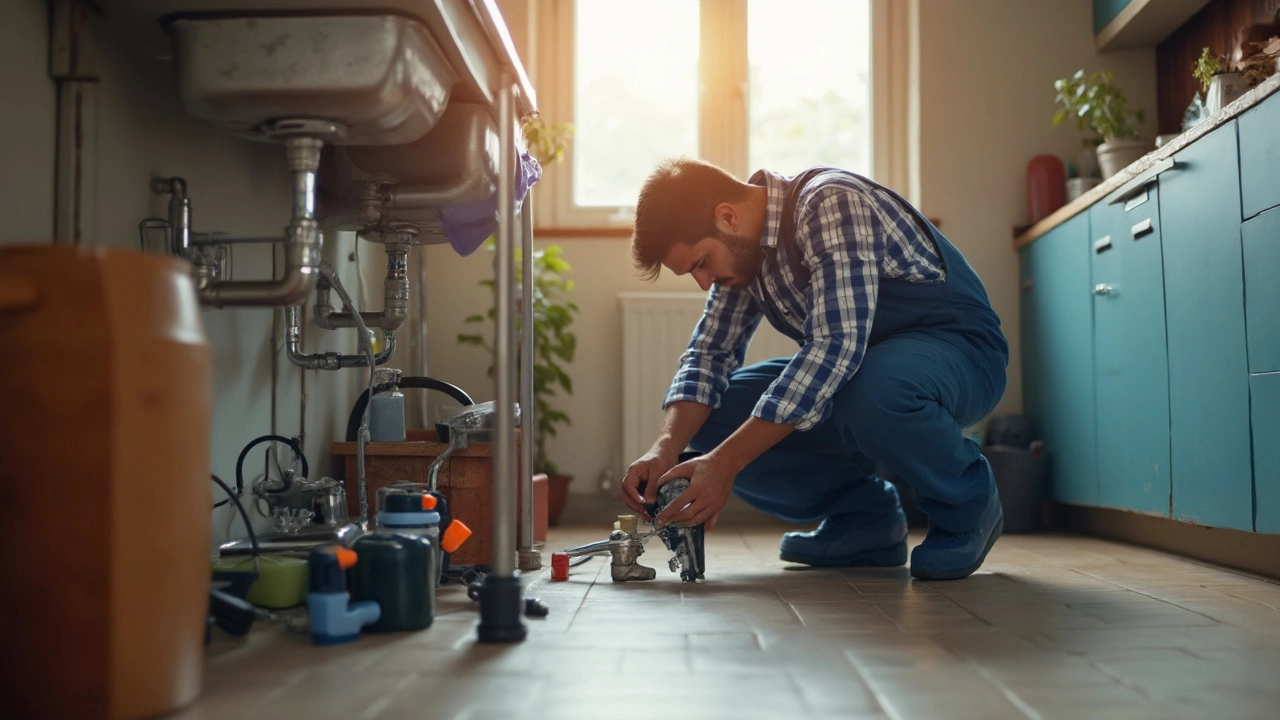Thinking of fixing that leaky faucet without calling a plumber in California? Hold on a second. You might need to know a bit more about what the state says about DIY plumbing first. California has pretty strict rules about who can do plumbing. Why do they care so much? It's mainly about safety and ensuring everything's up to code.
If you're just tackling small tasks, like replacing a showerhead or unclogging a drain, you might not need a license. But if it involves messing with the main lines or doing bigger installations, you'll definitely want to look into getting some proper credentials.
Why risk it, though? It's crucial to know what's allowed and what's not. There's nothing worse than starting a project and finding out halfway through that you're in way over your head—or worse, that you've broken the law. Even worse, messing up plumbing can lead to serious damage. Who wants a flooded house?
- Understanding Licensing Requirements
- Tasks You Can Do Without a License
- Risks of DIY Plumbing
- When to Hire a Professional
- Getting the Right Training
Understanding Licensing Requirements
In California, if you're thinking about doing any plumbing work, you should definitely get familiar with the state's licensing laws. The state takes plumbing tasks seriously due to the potential impact on the public's health and safety. So, what exactly do you need to know?
Who Needs a License?
Basically, if you're planning to work as a professional plumber or offer plumbing services for money, you'll need a plumbing license. The plumbing license California requires involves passing a test that checks your knowledge about plumbing codes, regulations, and safety practices.
If you're an amateur interested in fixing minor plumbing issues at home, like maybe repairing a toilet or fixing a leaky pipe, you generally won't need a license for those tasks. Anything more complex, especially those that involve the California Building Code, will likely require professional involvement.
Types of Licenses
California offers different types of plumbing licenses. Here are some:
- C-36 License: This is the standard license for general plumbing work. It's what most people get when they want to become a professional plumber.
- Journeyman's Card: This isn't a full license but it's a step towards working independently. It allows you to work under a licensed contractor.
- Master Plumber License: This is usually for those looking to operate their own business or manage large teams of plumbers.
How Do You Get Licensed?
To get a plumbing license in California, you'll need to meet specific requirements, including completing the necessary education and work experience hours, and then passing an exam. Many folks start with a plumber training course to gain the knowledge and practical skills needed.
Once you've got that sorted, you can apply for the exam. If you're successful, congratulations! You'll officially be a licensed plumber. If you'd rather not go it alone, consider working for an established plumbing company to gain more experience.
Why Bother with Licensing?
Besides staying on the right side of the law, having a license shows clients that you're credible and trustworthy. It could be the difference between landing a big job or losing it to another plumber who can prove they're qualified.
So, unless you're just looking to do some basic maintenance at home, getting licensed is a vital step if you want to pursue plumbing as a career.
Tasks You Can Do Without a License
So, you're thinking of dipping your toes into plumbing without a license in California? Good news! There are quite a few small tasks you can tackle without running afoul of the law. These jobs are usually about maintenance or minor fixes that don't involve touching the main plumbing lines.
Simple Repairs and Replacements
If you’ve ever dealt with a dripping faucet, then you know how annoying it can be. The great news? You don’t need a plumbing license to fix that. Changing out a washer or faucet cartridge is typically license-free. The same applies for swapping out a shower head or a toilet flapper.
Clogs and Blockages
Got a slow-draining sink or bathtub? Before you call in a pro, see if you can handle it on your own by removing the blockage with a plunger or a handheld snake. As long as you’re not taking apart the pipes, you’re in safe territory.
Small Fixture Installations
Installing something like a new kitchen faucet or a showerhead is usually fair game. These tasks don't typically require any changes to the main plumbing system, so you can go ahead and practice those DIY skills.
Minor Appliance Connections
Are you planning to hook up a new dishwasher or washing machine? These appliances come with instructions, and as long as you're just connecting hoses or plugging in the unit, you typically won't need a license. But contact a licensed plumber if you're dealing with complex hookups.
Remember the Limits
Keep in mind that while you’re free to handle these simpler tasks, anything involving gas lines, complex installations, or major changes to the plumbing system is off-limits without proper training. It's crucial to know your limits to avoid costly mistakes.
Staying informed about these tasks can save you time and money. Plus, it's always satisfying to complete a DIY project knowing you've done it safely and legally.

Risks of DIY Plumbing
Doing your own plumbing work in California might seem like a great way to save some cash, but it can backfire in unexpected ways. Sure, it feels awesome when you fix that leak on your own, but there are hidden dangers lurking that can trip you up.
Potential for Costly Mistakes
Think you'll save a few bucks? Maybe. But mess up a pipe or install something wrong, and you could end up spending way more than you would have on a professional. Water damage isn't just a quick mop-up—it can wreck floors and walls, and that costs a bundle to fix.
Health and Safety Concerns
When it comes to plumbing, safety is a biggie. You're dealing with water supply lines, waste systems, and even gas lines if you're adventurous enough. Incorrect installation can lead to leaks that might not just damage property but also pose health risks. Mold and mildew love damp environments, and they aren't good roommates.
“DIY plumbing can often lead to problems that require more costly solutions later on, especially if you're not familiar with local building codes,” cautions Chris Johnson, a certified California plumber.
Legal Implications
Operating outside the law can land you in hot water—pun intended. California takes its licensing seriously, and doing extensive work without a license can result in fines. If you plan to sell your home in the future, unlicensed plumbing work might also complicate the inspection process.
Insurance Woes
Say you have a water-related mishap. If the insurance company finds out you did the plumbing yourself, they might reject your claim. Why complicate things when a licensed plumber's services would keep you on the safe side?
Breaking Down the Risks
| Risk | Potential Impact |
|---|---|
| Improper Installation | Water damage, increased repair costs |
| Health Hazards | Mold growth, unhealthy living conditions |
| Legal Issues | Fines, complications during home resale |
| Insurance Denial | Rejected claims for damages |
So, while it seems tempting to handle your own plumbing tasks in California, remember these risks. There's a fine line between what's doable on your own and what's best left to the pros. And if you're still keen, getting a plumber training course under your belt could be a lifesaver.
When to Hire a Professional
So, when should you put down that wrench and call in a licensed plumber? There are definitely moments when bringing in a pro isn't just wise—it's necessary. Let's break it down so you're not left scratching your head.
Complex Installations and Repairs
If you're dealing with big jobs like installing a new water heater or re-piping your house, it's time to call a professional. These tasks require expertise and experience that only a licensed plumber can provide. Trying to DIY could lead to improper installations, voiding warranties, and much worse.
Code Compliance
California plumbing codes are there for a reason: safety. They ensure that all plumbing work meets certain health and safety standards. When facing situations where the work needs to be inspected or certified, like additions to your home or changes to existing plumbing systems, hiring a licensed professional becomes non-negotiable.
Preventing Future Problems
While you can handle small tasks, a professional can identify potential issues before they become serious problems. Skilled plumbers have the training to spot things like low water pressure, slow drainage, and leaks that you might miss.
Emergency Situations
Let's say your bathroom is flooding at 2 a.m., or a pipe just burst in your kitchen. Emergencies aren't the time to experiment. In these cases, a professional has the tools and knowledge to fix the problem quickly, minimizing damage to your home.
Securing Proper Permits
For certain larger jobs, you'll need permits, and those permits are often only obtainable through licensed plumbers. It's not just about avoiding fines; it's about ensuring the job is done right from the start.
Keep in mind that hiring a pro might cost more upfront, but the expertise and peace of mind are worth it. In the end, you avoid expensive fixes later and protect your home investment.

Getting the Right Training
So, you've decided you want to dive into plumbing a bit more seriously, maybe even take on some tasks that require a license? Smart move! Getting proper training can open up a lot of opportunities, and it's not as tough as you might think.
The state of California has specific requirements for becoming a licensed plumber. You'll need to complete about 4-5 years of practical experience, which is usually done through an apprenticeship program. These programs often combine on-the-job training with classroom instruction.
What's an Apprenticeship?
An apprenticeship is like the training wheels of the plumbing world. You work under experienced professionals, gaining skills and confidence before branching out on your own. These programs are usually offered by trade unions or contractor associations.
Course Content and Structure
Most training courses cover everything from basic plumbing techniques to advanced skills. Expect to learn about installing fixtures, working with various pipe materials, and understanding building codes, which are crucial if you'll be working independently. Some courses even offer insights into business management if you aim to run your own shop one day.
Online vs. In-Person Training
These days, many programs offer online courses alongside traditional classroom learning. Online courses provide flexibility, but hands-on experience is second to none. If you choose an online route, make sure it includes plenty of practical workshops.
- Cost: Training programs can cost anywhere from hundreds to thousands of dollars, depending on the comprehensiveness and duration.
- Duration: Apprenticeships typically take about four years, but some intensive programs can be shorter.
If you're feeling ambitious and ready to commit the time and effort, getting formal training is a fantastic step toward making sure you're doing everything by the book and maybe even turning plumbing into a cool career.


